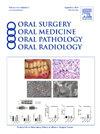Adenomatoid hyperplasia of minor salivary glands: a systematic review
IF 2
3区 医学
Q2 DENTISTRY, ORAL SURGERY & MEDICINE
Oral Surgery Oral Medicine Oral Pathology Oral Radiology
Pub Date : 2025-02-01
DOI:10.1016/j.oooo.2024.10.081
引用次数: 0
Abstract
Objective
To systematically review available data regarding adenomatoid hyperplasia of minor salivary glands (AHMSG).
Study Design
Electronic searches were performed in six databases and gray literature. The risk of bias was assessed using the Joanna Briggs Institute tool.
Results
Forty studies reporting 121 cases of AHMSG were included. There is a male predominance (n = 72/64.29%), with individuals in their fourth and fifth decade of life being the most affected. The palate was the main anatomical location (n = 90/74.39%), and most lesions presented as single, asymptomatic nodules. The mean size of AHMSGs was 1.48 ± 0.77 cm, and the mean evolution time was 16.84 ± 25.67 months. Immunohistochemical evaluation in three cases (2.48%) showed a low labeling index for Ki-67 (n = 2/66.67%) and proliferating cell nuclear antigen (n = 1/33.33%).
Conclusions
AHMSG is an uncommon benign lesion with no tendency to recur after initial surgical removal. The main histological features include an abundant proliferation of glandular acini, occasional ductal dilation, and sometimes the presence of inflammatory infiltrate. Pathologists and clinicians should be aware of AHMSG, as it can closely resemble both benign and malignant salivary gland lesions.
小唾液腺腺瘤样增生:系统综述。
研究目的系统回顾有关小唾液腺腺瘤样增生症(AHMSG)的现有数据:研究设计:在六个数据库和灰色文献中进行了电子检索。结果:40 项研究报告了 121 例唾液腺腺瘤样增生症病例:结果:共纳入40项研究,报告了121例AHMSG病例。男性占多数(n = 72/64.29%),第四和第五个十年期的患者发病率最高。腭是主要的解剖位置(n = 90/74.39%),大多数病变表现为单个无症状结节。AHMSGs的平均大小为(1.48 ± 0.77)厘米,平均演变时间为(16.84 ± 25.67)个月。3例(2.48%)病例的免疫组化评估显示,Ki-67(n = 2/66.67%)和增殖细胞核抗原(n = 1/33.33%)的标记指数较低:AHMSG是一种不常见的良性病变,初次手术切除后无复发倾向。主要的组织学特征包括腺尖头大量增生、偶见导管扩张,有时还伴有炎症浸润。病理学家和临床医生应了解 AHMSG,因为它可能与良性和恶性唾液腺病变非常相似。
本文章由计算机程序翻译,如有差异,请以英文原文为准。
求助全文
约1分钟内获得全文
求助全文
来源期刊

Oral Surgery Oral Medicine Oral Pathology Oral Radiology
DENTISTRY, ORAL SURGERY & MEDICINE-
CiteScore
3.80
自引率
6.90%
发文量
1217
审稿时长
2-4 weeks
期刊介绍:
Oral Surgery, Oral Medicine, Oral Pathology and Oral Radiology is required reading for anyone in the fields of oral surgery, oral medicine, oral pathology, oral radiology or advanced general practice dentistry. It is the only major dental journal that provides a practical and complete overview of the medical and surgical techniques of dental practice in four areas. Topics covered include such current issues as dental implants, treatment of HIV-infected patients, and evaluation and treatment of TMJ disorders. The official publication for nine societies, the Journal is recommended for initial purchase in the Brandon Hill study, Selected List of Books and Journals for the Small Medical Library.
 求助内容:
求助内容: 应助结果提醒方式:
应助结果提醒方式:


